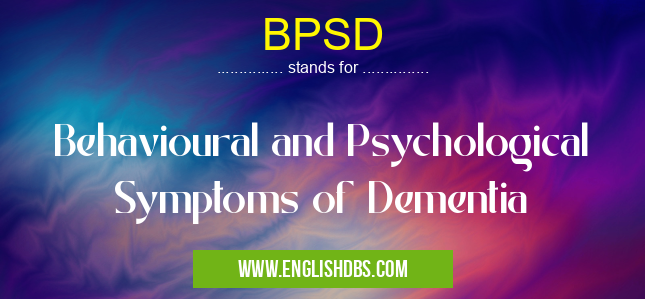What does BPSD mean in PSYCHOLOGY
Behavioural and Psychological Symptoms of Dementia, commonly known as BPSD, is a term used to describe the non-cognitive symptoms that occur in individuals who are living with dementia. These symptoms include aggression, depression, anxiety, agitation, involuntary movements and impairments in functioning. Commonly seen among those living with dementia, BPSD can negatively impact an individual's quality of life and impair relationships with family members and care givers. It is important to note that not all symptoms of BPSD will display in everyone; each person will have their own unique set of symptoms that they experience.

BPSD meaning in Psychology in Academic & Science
BPSD mostly used in an acronym Psychology in Category Academic & Science that means Behavioural and Psychological Symptoms of Dementia
Shorthand: BPSD,
Full Form: Behavioural and Psychological Symptoms of Dementia
For more information of "Behavioural and Psychological Symptoms of Dementia", see the section below.
What Does BPSD Stand For?
BPSD stands for Behavioural and Psychological Symptoms of Dementia. This term is used to refer to the difficulties encountered by individuals living with dementia that cannot be attributed to cognitive decline. These may include behavioural changes such as aggression or depression, as well as psychological disturbances such as anxiety or impaired social functioning.
What Are The Symptoms Of BPSD?
The most common symptom of BPSD is an increase in aggressive behaviour, such as verbal abuse or physical outbursts. Other signs may include sudden changes in mood or personality; increased levels of confusion; sleep disturbances; restlessness; difficulty communicating effectively; and impaired social functioning or judgement. Additionally, individuals may experience memory loss, delusions, hallucinations or paranoia.
How is BPSD Treated?
It is important to seek professional medical advice when dealing with any symptoms related to dementia, including those associated with BPSD. Treatment goals should focus on managing behaviours related to the disorder while also providing emotional support for those affected by it. Depending on the severity of each individual case, several different treatments may be recommended including medications aimed at controlling behavioural issues; psychosocial therapies designed to address psychological issues; environmental modifications intended to minimise triggers for negative behaviours and improve overall quality of life; or providing training and support for caregivers in order to better manage difficult situations that arise due to the presence of behavioural issues.
Essential Questions and Answers on Behavioural and Psychological Symptoms of Dementia in "SCIENCE»PSYCHOLOGY"
What are the Behavioural and Psychological Symptoms of Dementia?
Behavioural and psychological symptoms of dementia (BPSD) are a group of behaviors and psychological changes associated with dementia that can affect how a person interacts with their environment. These include problems with memory, language, problem-solving, communication, behavior, mood, or personality. BPSD can range from mild to severe.
How common is BPSD?
BPSD is very common in individuals living with dementia. Estimates indicate that up to 90% of people with dementia will experience some form of BPSD during the course of their illness.
What causes BPSD?
The cause of BPSD is not known but it may be due to biological changes in the brain caused by dementia. It could also be related to environmental factors such as stress or boredom or may be linked to medical conditions or medications being taken by the person with dementia.
What are some common types of BPSD?
Common examples of BPSD include agitation, aggression, depression, delusions and hallucinations. Other less common examples include apathy, hyperactivity, impulsiveness and paranoia.
How can I recognize signs of BPSD?
Signs and symptoms can vary widely but some common signs are changes in behaviour such as increased agitation or aggression; changes in mood such as anxiety or depression; changes in sleep patterns; difficulty communicating; and delusions or hallucinations.
How do I manage someone who has become agitated due to BPSS?
It is important to try to identify what might be causing the agitation before trying any intervention strategies as this can help tailor interventions more effectively. Some strategies may include providing reassurance through a calm voice; redirecting away from distressing topics or activities; providing distraction such as music; encouraging physical activity if possible; talking to their doctor about medication options if necessary; creating a safe environment for them free from clutter and hazards; providing support from family members for emotional needs.
Are there any treatments available for managing BPSS?
Treatment for managing behavioural and psychological symptoms of dementia (BPSD) depends on the severity of the symptoms and can involve medication as well as non-pharmacological approaches such as psychosocial interventions like tailored activities that target difficulties experienced by an individual living with dementia like reminiscence therapy, occupational therapy/activity programmes etc.; environmental design where physical settings are tailored around an individual’s needs and strengths e.g furniture configuration etc.; behavioural management techniques which involve understanding an individual’s comfort levels in different situations over time.
Final Words:
Behavioural and Psychological Symptoms of Dementia (BPSD) are common among those living with dementia but can vary greatly from one person to another in terms of intensity and manifestation. Early diagnosis and treatment planning can help reduce the frequency and severity of these symptoms while also improving quality of life for those affected by this condition. Many different types of treatments exist which are tailored specifically towards managing the various behavioural and psychological challenges associated with this disorder.
BPSD also stands for: |
|
| All stands for BPSD |
